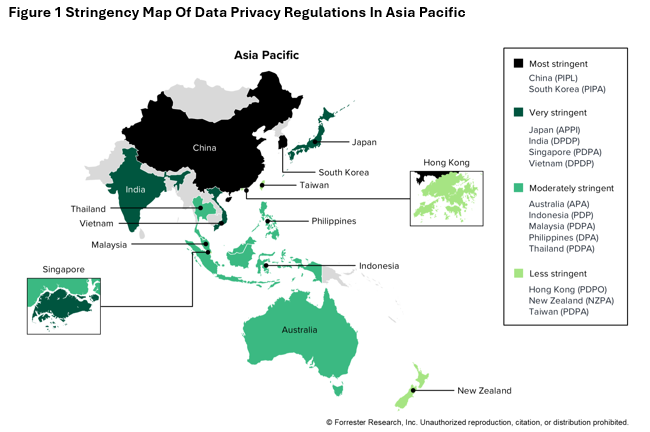GDPR Isn’t Enough: Navigate Privacy Regulations In APAC
According to Forrester’s Business Privacy Survey 2024, 46% of privacy decision-makers in Asia Pacific (APAC) report full compliance with GDPR. However, compliance with the EU’s GDPR alone isn’t sufficient in APAC, where local regulations may impose additional or different requirements. My recent report, “Navigating Privacy Regulations In Asia Pacific,” highlights the key APAC privacy regulations that are most relevant to marketers.
APAC Privacy Regulations Differ From GDPR In Three Key Aspects
In APAC, local privacy regulations may impose different or additional requirements compared to GDPR. Key ones include:
- Data localization. GDPR ensures data protection regardless of location but doesn’t mandate specific country storage. APAC regulations like China’s Personal Information Protection Law (PIPL) and Vietnam’s Decree on Personal Data Protection (DPDP) require certain data to be stored within their countries.
- Cross-border data transfers. GDPR allows transfers with adequate protection or explicit consent. China’s PIPL and Vietnam’s DPDP require government approvals and security assessments. Japan’s APPI requires opt-in consent.
- Legitimate interests. GDPR allows processing for legitimate interests like marketing, provided it doesn’t override individual rights. In APAC, only the Australian Privacy Act and Singapore’s Personal Data Protection Act recognize legitimate interests; others require consent.
APAC Privacy Regulations Demonstrate Various Levels Of Stringency
Many APAC privacy regulations have adopted GDPR-like principles, such as data subject rights, consent requirements, and breach notification obligations. However, the details and stringency vary across the region (see Figure 1).

Navigate Three Key Dimensions That Are Most Relevant To Marketers
Marketers should focus on the components of these regulations relevant to consumer engagement and marketing activities. Emphasize the following three key dimensions:
- Fundamental requirements. To conduct compliant marketing, marketers need to understand APAC regulations’ various requirements around consent and opt-out (including cookies), sensitive data and children’s privacy, data localization and cross-border transfer requirements, and penalties for breaches.
- Transparency, minimization, and security. Marketers need to follow APAC regulations’ varying requirements on data use transparency, minimization, and data breach notification, which are vital for compliance and consumer trust.
- Data subject rights. APAC regulations also vary in terms of granting consumers rights to know, access, correct, object, limit, transfer, and delete their data. Some regulations address automated decision-making, which is important for marketing automation and AI.
Marketers: Adopt A Proactive Privacy Strategy
Understanding the most relevant privacy requirements in APAC and meeting all compliance requirements are only the first steps for the region’s marketers. The goal is to adopt a proactive privacy strategy in marketing, earn customers’ trust, and be truly privacy-first. Forrester clients can access the full report to navigate the region’s complex privacy regulations, benchmark themselves against GDPR, and adopt a proactive, privacy-first marketing strategy. To find out more, schedule a guidance session with me.
